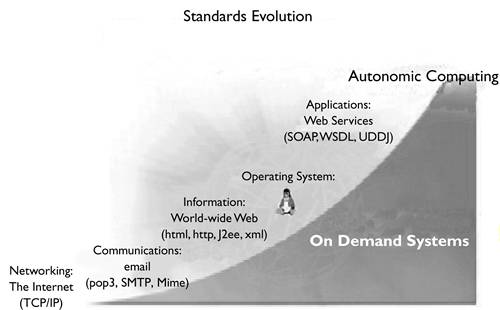| The real world question is as follows: "What value will open standards present to corporations?" The answer is choice—the flexibility to choose the right systems, the right hardware and software to support the corporation's objectives. Another benefit is the ability to seamlessly integrate new systems into standardized architecture that works with the existing set of mixed hardware, software, protocols, and networks on heterogeneous systems. Any future software that supports open standards that can easily be deployed will gain substantial market share. It makes good business sense. The evolution and development of open standards is strategic in the next few years as indicated by Figure 9.2. The more systems in an on demand world, the more open standards will be needed. Figure 9.2. In an on demand world, the integration and adoption of open standards is nothing less than vital. 
The adoption of open standards and vendor neutral applications is critical for unleashing power, speed, and innovation in the future economy, and the interest in their development among leading vendors is gaining ground. Open standards have the potential of restructuring the software industry. Advantages include less complexity, ease of use and installation, and the reduction of costs and support, so open standards are rapidly gaining ground in most forward-thinking corporations. The way ahead is to more open and unified systems. IBM refers to these circumstances as a "threshold moment," a time when the demonstrated need is so urgent as to require a whole new conception of the problem and the solution. IBM's solution, autonomic computing, seeks to alleviate these forces by using examples of automation in nature and in past threshold moments as the foundation for a new model of computing. Simply put: Open standards convert technology into the universal world of business. | 